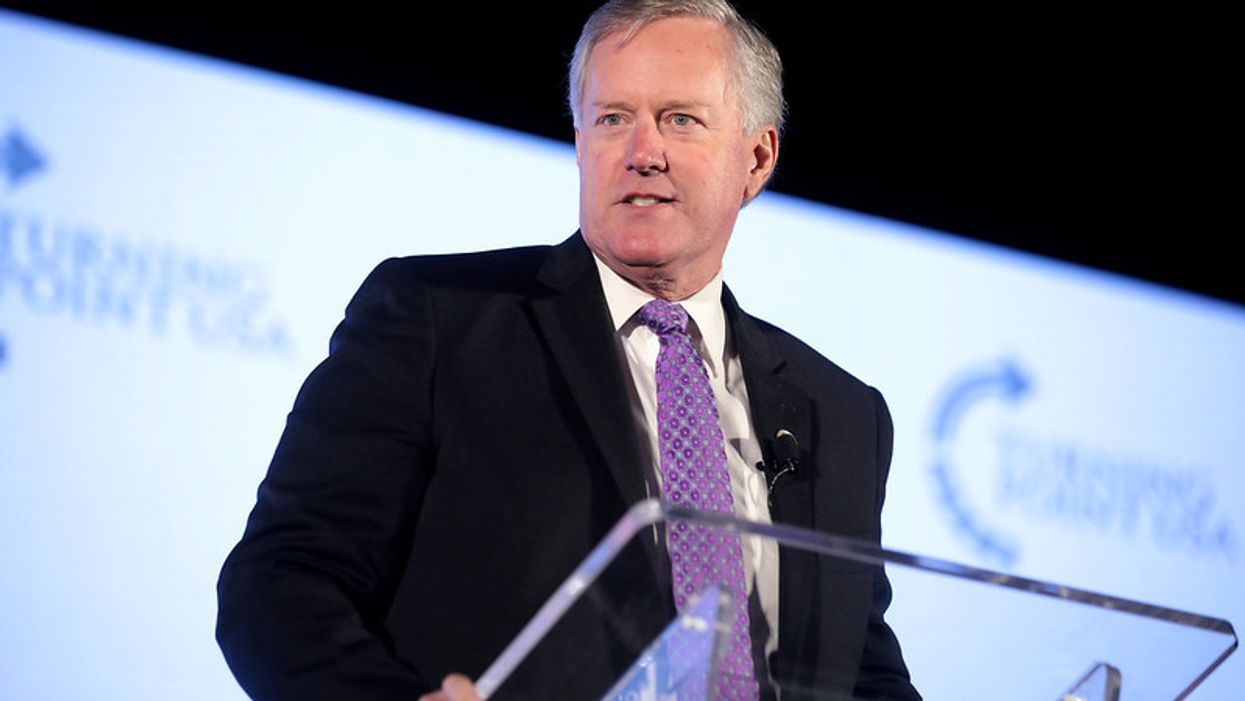Mark Meadows And The Real Voter Fraud
On December 20, 2020, White House Chief of Staff Mark Meadows was still refusing to come to grips with Joe Biden's election victory. "Several members of Congress just finished a meeting in the Oval Office with President Donald Trump, preparing to fight back against mounting evidence of voter fraud," he announced on Twitter. "Stay tuned."
That evidence never quite materialized. Meadows and Co. were looking in the wrong place. The right place would have been Scaly Mountain, North Carolina.
There, a man who owned a home in the Washington, D.C., area, where he worked, had registered to vote in 2020. In his form, he gave a Scaly Mountain address where he apparently had never lived. He then voted absentee in the November election. His name: Mark Meadows.
On Wednesday, the North Carolina State Board of Elections announced that it had removed Meadows from the voter rolls "after documentation indicated he lived in Virginia and last voted in the 2021 election there." That leaves open the question of whether Meadows misrepresented his domicile in 2020 — a federal crime punishable by up to five years in prison.
That question can be determined only in a court of law. But we can say there is, uh, mounting evidence against Meadows.
Much of it emerged in a March article in The New Yorker magazine, which revealed that the dwelling is a small mobile home with a rusted roof that Meadows has never owned. The woman who owned it in 2020 said Meadows' wife had once rented it for two months but used it for only a night or two. And Meadows himself? "He did not come. He's never spent a night in there."
It's always possible that he sneaked in under cover of darkness for a night of slumber. But that wouldn't validate his claim. He would need some tangible record to indicate he made it his home — a driver's license, tax form or utility bill, for example. If Meadows has any of those, he has yet to make them public.
But we know he takes a stern view of voter fraud, because he has told us so. We also know his party claims to share that view.
Many Republican officials and activists have spent the past 18 months spreading the lurid fiction that Biden stole the election.Trump's own attorney general, William Barr, has said that "all this stuff was bulls—-." But a December poll found that 83 percent of Republicans think Biden owed his victory to "fraudulent ballots."
It is Meadows' good fortune that he has so far escaped the sort of scrutiny that more obscure voters have encountered. One victim is Crystal Mason, who went to the polls in Texas in November 2016, three months after her release from prison. When her name could not be found on the rolls, an election official told her that she could cast a provisional ballot and that it would not be counted unless she was found to be eligible.
Mason was unaware that, being on parole, she wasn't allowed to vote — something her probation officer admitted in court that he never told her. But innocent intent was no excuse. The Tarrant County district attorney, a Republican, prosecuted and won a conviction — which carried a five-year prison term.
Not every offender gets such tough treatment. As Vann Newkirk II reported in The Atlantic: "In 2018, Russ Casey, a Republican judge in Tarrant County, pleaded guilty to falsifying signatures in order to get his name on the ballot. Casey held a position of public trust, his actions were egregious, and he admitted that the accusations were true. In a plea deal, he received five years' probation, with no prison time."
Two men who lived in The Villages, a Trump stronghold in Florida, pleaded guilty to voting multiple times in 2020. They were sentenced to do 50 hours of community service and take a civics class.
Meadows may not spend time in a correctional facility, even if it is proven that he lied. But there has been a notable lack of interest in what could be a serious federal crime on his part. A search of the Fox News website finds no mention of this story. Republicans have not worn out their lungs demanding that he be brought to justice.But their supposed commitment to protect election integrity and ballot security has always been more about deterring Democrats from voting than with protecting democracy. That's the real voter fraud.
Follow Steve Chapman on Twitter @SteveChapman13 or at https://www.facebook.com/stevechapman13. To find out more about Steve Chapman and read features by other Creators Syndicate writers and cartoonists, visit the Creators Syndicate website at www.creators.com.












